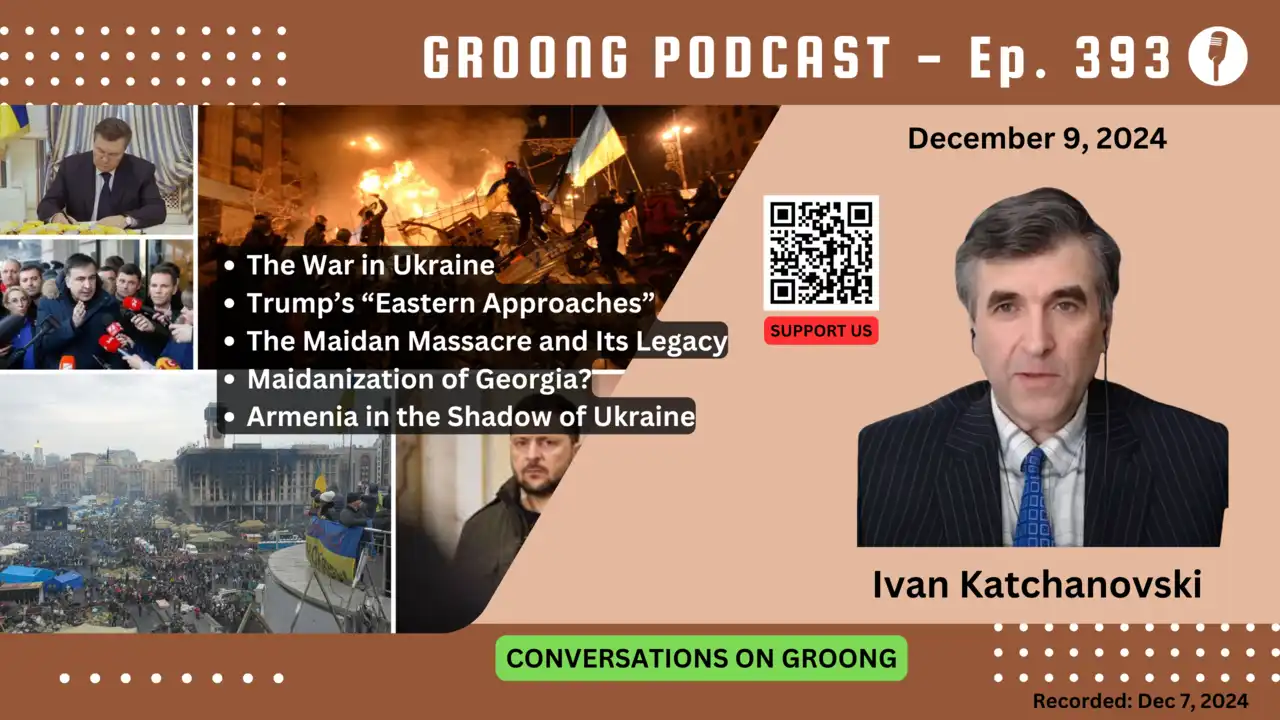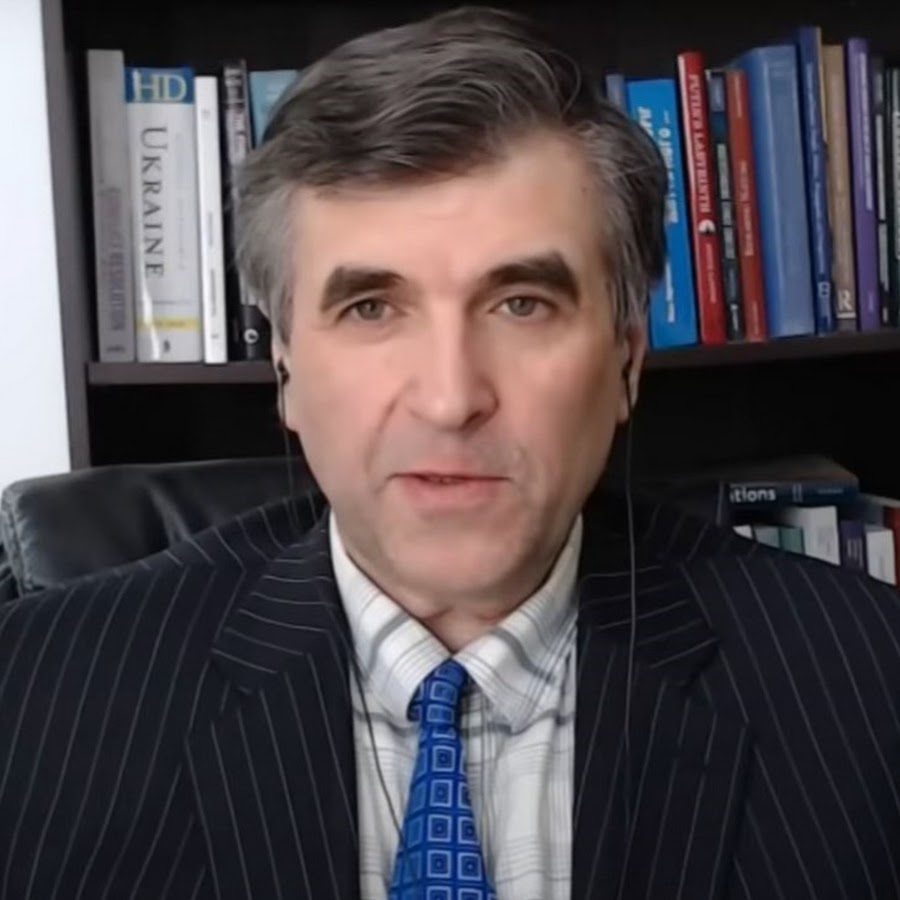
Groong Links:
Guest:
- Prof. Ivan Katchanovski, University of Ottawa
SUPPORT PROF. KATCHANOVSI’S WORK HERE: https://gofund.me/52b68e07
Topics:
- The War in Ukraine
- Trump’s “Eastern Approaches”
- The Maidan Massacre and Its Legacy
- Maidanization of Georgia?
- Armenia in the Shadow of Ukraine
Episode 393 | Recorded: December 7, 2024
Show Notes
Ukraine and the Legacy of the Maidan
Prof. Katchanowski, since this is your first time on our podcast, can you summarize for our listeners your research interests and your past academic work?
The War in Ukraine
We’ll dive into your book in a moment, but first let’s focus on what is happening today on the ground in Ukraine.
The war in Ukraine has been raging for nearly three years now. The advance of the Russian forces, while initially modest, has been accelerating, and they are now moving forward tens of kilometers per day.
You’ve been assembling a count of casualties from the war and sharing that on Twitter.
Questions:
- What are the latest figures, and how do they reflect the human cost of the conflict?
Ukrainian Fates and Lost Opportunities
The parties were very close to signing a ceasefire in March 2022, less than 2 weeks into the war. Yet, it is common knowledge that Boris Johnson personally intervened and urged Zelensky not to agree.
Questions:
- What was on the table in Istanbul in March 2022 and why did Zelensky withdraw from the agreement?
- Was that a rational choice at the time?
- Given the continuing losses of lives and territory, with the trajectory of the war, why is Zelensky continuing the war?
Personal Reflections
Hovik: I spent many childhood summers in Donetsk and I recall it as a tranquil and beautiful place. You yourself are from Ukraine.
Questions:
- Can you describe how this conflict has personally affected you and your family?
- Have you been able to visit Ukraine recently, despite your criticisms of Zelensky’s policies?
Trump’s “Eastern Approaches”
US President-elect Donald Trump famously pledged to end the war in Ukraine in “24 hours” after becoming president. Yet, we’re seeing that he’s stacking his cabinet with neocon appointments. Trump appointed Keith Kellogg, an 80 year old retired general who has backed the “peace through strength” narrative, and that if Putin doesn’t agree with Trump, the US will arm Ukraine exponentially more, etc.
Still it is clear that negotiations are already going on. For example we’ve read that Zelensky has floated a “territory for NATO membership” type deal to Russia.
Questions:
- First, Prof. Katchanovski, what do you think, could Trump seriously end the war within 24 hours? Is the prospect for a negotiated peace realistic anytime soon, in light of current developments?
- How do you assess the most recent actions of the Biden administration in relation to Ukraine, following Trump’s election?
- Ukrainian President Volodymyr Zelensky flew to Paris today to meet with Trump and French President Emmanuel Macron. What do you expect from this visit? What is Zelensky hoping to gain?
- What would constitute a durable ceasefire or negotiated peace deal at this point, in your view?
The Maidan Massacre and Its Legacies
Professor, in your book The Maidan Massacre in Ukraine, (link in show notes) you dive deep into the Maidan movement, starting in November 2013, which was sparked by Ukraine’s abrupt decision to suspend its association agreement with the European Union, favoring closer ties with Russia instead.
What began as peaceful demonstrations escalated into violent confrontations, culminating in the February 2014 Maidan Massacre. This mass killing led to the ousting of President Viktor Yanukovych and significantly altered Ukraine’s political trajectory.
Your research has been pivotal in analyzing these events, offering insights that challenge mainstream narratives.
Context
The focal point of your book of course is the Maidan massacres in Ukraine, resulting in the deaths of more than a 100 people. But it didn’t happen out of the blue.
Questions:
- Maybe you can walk us through what was happening in the months leading up to the Maidan massacre and the toppling of Yanukovych?
- How powerful or significant a force is the “far right” in Ukraine?
- In November 2013, in the months before the Maidan in Ukraine, Armenian president Serzh Sargsyan was faced with an “all-or-nothing” choice by the EU with regard to the EU’s Eastern Partnership “Association Agreement.” However, in the end, Sargsyan managed to strike a balance, by pursuing membership in the Russian-led Eurasian Economic Union, while also maintaining ties with Brussels. Ukraine’s Yanukovych was faced with a similar situation, but the outcome, as we know, was dramatically different. Why was this the case?
- What was the EU’s “Eastern Partnership”? What factors influenced the EU’s “Eastern policy” toward former Soviet republics like Ukraine and Armenia? Why wasn’t Russia offered such an agreement?
- What kind of a deal was the EU offering Ukraine? What were the terms?
- In your view, was the Maidan movement a coup sponsored by external powers?
Events
The key events of the Maidan movement include the initial protests in November 2013, the violent clashes in January 2014, and the Maidan Massacre in February 2014. The massacre resulted in the deaths of protesters and police officers, toppling Yanukovych’s government and shifting Ukraine’s political alignment.
Questions:
- What evidence from your research challenges the mainstream narrative of the Maidan Massacre?
- Who were the Georgian snipers, and how do their accounts influence the interpretation of the massacre? What was the role of Mikheil Saakashvili?
Politics of publication
You initially released the book electronically, available for all to read. The hardcover was published by Palgrave Macmillan.
Questions:
- What motivated you to ensure free access to the electronic version of your book?
- Did you encounter problems in publishing a book with findings that challenge the mainstream narrative?
- What kind of feedback have you received from readers in Ukraine, Russia, and the West?
Maidanization of Georgia?
Over the past few weeks, we saw mass protests in Georgia. The focus of the unrest is the ruling party Georgian Dream’s relations with the West. In October, the party won a decisive victory in the elections, the results of which are not being recognized by the pro-West opposition.
Questions:
- On social media, a video has recently surfaced showing representatives of the Georgian opposition handing out cookies in Tbilisi. The image seems all too familiar. Do you believe that the fervor with which the West is pushing the Georgian opposition could lead to a “Maidanization” of the situation in Tbilisi? What is your assessment?
Armenia in the Shadow of Ukraine
Lastly, Armenia under Nikol Pashinyan is currently attempting a geopolitical pivot westward, aligning itself with Western powers, namely the United States and France, while trying to move away from its traditional alliances with Russia and Iran.
Questions:
- As a political scientist, how do you assess Pashinyan’s attempted pivot?
References
- The Maidan Massacre in Ukraine, Ivan Katchanovski, 2024
Wrap-up
That’s our show! We hope you found it useful. Please find us on Social Media and follow us everywhere you get your Armenian news.
Thanks to Laura Osborn for the music on our podcasts.
Thanks to Pietro Shakarian for reviewing our questions for Prof. Katchanovski.
Guests

Ivan Katchanovski
Ivan Katchanovski is a Ukrainian and Canadian political scientist and professor at the University of Ottawa in Canada. He held academic positions at Harvard University, the State University of New York at Potsdam, the University of Toronto, and the Kluge Center at the Library of Congress. His academic publications include 5 books, 21 articles in peer-reviewed journals, and 13 book chapters. His publications, interviews, and comments appeared in more than 3,500 media reports in over 80 countries.
Hosts

Hovik Manucharyan
Hovik Manucharyan is an information security engineer who moved from Seattle to Armenia in 2022. He co-founded the ANN/Groong podcast in 2020 and has been a contributor to Groong News since the late 1990s.
Disclaimer: The views expressed by Hovik Manucharyan on the ANN/Groong podcast are his own and do not necessarily reflect the opinions of his employer or any other organization.

Asbed Bedrossian
Asbed Bedrossian is an IT professional, and for years oversaw the central IT enterprise infrastructure and services at USC. His decades of experience spanned across IT strategy, enterprise architecture, infrastructure, cybersecurity, enterprise applications, data center operations, high performance computing, ITSM, ITPM, and more.
Asbed founded the Armenian News Network Groong circa 1989/1990, and co-founded the ANN/Groong podcast in 2020.